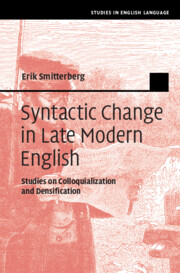
-
Select format
-
- Publisher:
- Cambridge University Press
- Publication date:
- November 2021
- November 2021
- ISBN:
- 9781108564984
- 9781108474221
- 9781108463973
- Dimensions:
- (228 x 152 mm)
- Weight & Pages:
- 0.61kg, 316 Pages
- Dimensions:
- (229 x 152 mm)
- Weight & Pages:
- 0.48kg, 316 Pages
Book description
Syntactic Change in Late Modern English presents a stability paradox to linguists; despite the many social changes that took place between 1700 and 1900, the language appeared to be structurally stable during this period. This book resolves this paradox by presenting a new, idiolect-centred perspective on language change, and shows how this framework is applicable to change in any language. It then demonstrates how an idiolect-centred framework can be reconciled with corpus-linguistic methodology through four original case studies. These concern colloquialization (the process by which oral features spread to writing) and densification (the process by which meaning is condensed into shorter linguistic units), two types of change that characterize Modern English. The case studies also shed light on the role of genre and gender in language change and contribute to the discussion of how to operationalize frequency in corpus linguistics. This study will be essential reading for researchers in historical linguistics, corpus linguistics and sociolinguistics.
Reviews
‘… Erik Smitterberg deserves praise for a twin achievement. For those readers who are primarily interested in Late Modern English syntax as it relates to colloquialisation and densification, his book provides rich corpus illustration and cogent analyses on many points of detail. Readers coming to the book with a more general interest in the role of corpus approaches in modelling syntactic change will benefit from much intelligent discussion of how the collective community record preserved in corpora relates to the historical dynamics of social networks and individual usage.’
Christian Mair Source: English Language and Linguistics
Contents
Metrics
Full text views
Full text views help Loading metrics...
Loading metrics...
* Views captured on Cambridge Core between #date#. This data will be updated every 24 hours.
Usage data cannot currently be displayed.
Accessibility standard: Unknown
Why this information is here
This section outlines the accessibility features of this content - including support for screen readers, full keyboard navigation and high-contrast display options. This may not be relevant for you.
Accessibility Information
Accessibility compliance for the PDF of this book is currently unknown and may be updated in the future.


